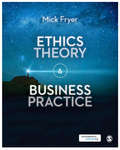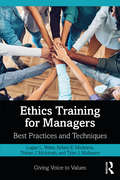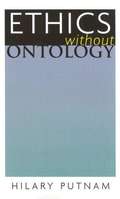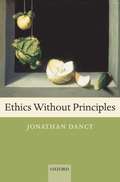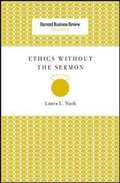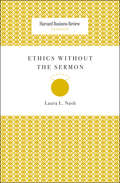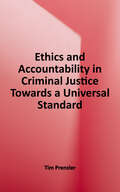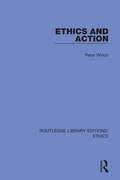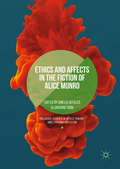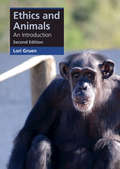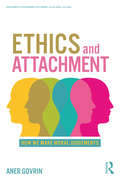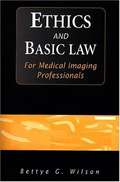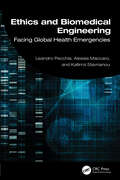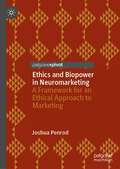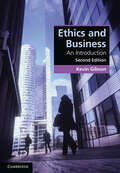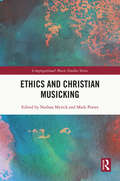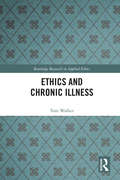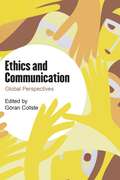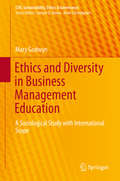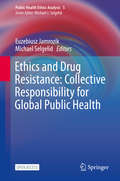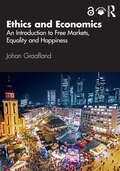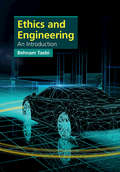- Table View
- List View
Ethics Theory and Business Practice
by Mick FryerIn his ground-breaking new textbook, Mick Fryer offers students of Business Ethics clear explanations of a range of theoretical perspectives, along with examples of how these perspectives might be used to illuminate the ethical challenges presented by business practice. The book includes: Realistic scenarios which gently introduce a theory and demonstrate how it can be applied to a real-life ethical dilemma that everyone can relate to, such as borrowing money from a friend Real organisational case studies in each chapter which illustrate how each theory can be applied to real business situations. Cases include Nike, Coca Cola, BMW, Shell, Starbucks and GSK 'Pause for Reflection' boxes and 'Discussion Questions' which encourage you to challenge the established notions of right and wrong, and empower you to develop your own moral code Video Activities in each chapter with accompanying QR codes which link to documentaries, films, debates and news items to get you thinking about real-life ethical dilemmas Visit the book's companion website for self-test questions, additional web links and more at: study.sagepub.com/fryer
Ethics Training for Managers: Best Practice and Techniques (Giving Voice to Values)
by Logan L. Watts Kelsey Medeiros Tristan McIntosh Tyler MulhearnCan employees be trained to make more ethical decisions? If so, how? Providing evidence-based and practical answers to these critical questions is the purpose of this book. To answer these questions, the authors—four organizational psychologists who specialize in the study of ethical decision making—translate insights based on decades of scientific research. Whether you are a student, educator, HR manager, compliance professional, or simply someone interested in the topic of ethics education, this book offers a road map for designing ethics training programs that work.
Ethics Without Ontology
by Hilary PutnamIn this brief book one of the most distinguished living American philosophers takes up the question of whether ethical judgments can properly be considered objective--a question that has vexed philosophers over the past century. Looking at the efforts of philosophers from the Enlightenment through the twentieth century, Putnam traces the ways in which ethical problems arise in a historical context. Hilary Putnam's central concern is ontology--indeed, the very idea of ontology as the division of philosophy concerned with what (ultimately) exists. Reviewing what he deems the disastrous consequences of ontology's influence on analytic philosophy--in particular, the contortions it imposes upon debates about the objective of ethical judgments--Putnam proposes abandoning the very idea of ontology. He argues persuasively that the attempt to provide an ontological explanation of the objectivity of either mathematics or ethics is, in fact, an attempt to provide justifications that are extraneous to mathematics and ethics--and is thus deeply misguided.
Ethics Without Principles
by Jonathan DancyJonathan Dancy presents a long-awaited exposition and defence of particularism in ethics, a view with which he has been associated for twenty years. He argues that the traditional link between morality and principles, or between being moral and having principles, is little more than a mistake. The possibility of moral thought and judgement does not in any way depend on an adequate supply of principles. Dancy grounds this claim on a form of reasons-holism, holding that what is a reason in one case need not be any reason in another, and maintaining that moral reasons are no different inthis respect from others. He puts forward a distinctive form of value-holism to go with the holism of reasons, and he gives a detailed discussion, much needed, of the currently popular topic of 'contributory' reasons. Opposing positions of all sorts are summarized and criticized. Ethics Without Principles is the definitive statement of particularist ethical theory, and will be required reading for all those working on moral philosophy and ethical theory.
Ethics Without the Sermon
by Laura L. NashA set of twelve questions provides executives with a framework to test pragmatically the ethical content of business decisions. The inquiry draws on traditional philosophical frameworks while avoiding the utopian and anticapitalistic bias prevalent in current applied business philosophy. The ethical inquiry method articulates corporate responsibilities and lays them open for examination.
Ethics Without the Sermon (Harvard Business Review Classics)
by Laura L. NashThis series now offers readers the opportunity to make seminal pieces a part of their permanent management library. Each highly readable volume contains a groundbreaking idea that continues to shape best practices and inspire countless managers around the world.
Ethics and Accountability in Criminal Justice: Towards a Universal Standard
by Tim Prenzler"Unique in the criminology literature. Well written, and accessible to a wide range of readers." - Professor Jenny Fleming, Tasmanian Institute of Law Enforcement Studies "Presents a series of policy recommendations that are potentially controversial but practical and progressive." Professor Rick Sarre, University of South Australia This book is designed to meet head on the urgent need for academics, advocates and policymakers to develop universal ethical standards in criminal justice practice. By using quality research and policy analysis focusing on the core components of the criminal justice system - police, courts and corrections- Professor Prenzler formulates a basic checklist that can be used to assess the ethical quality and accountability of the criminal justice system in any jurisdiction.
Ethics and Action
by Peter WinchOriginally published in 1972, and now with a new Preface by Michael Campbell, this collection of essays on closely related issues in moral philosophy looks at different aspects of people’s understanding of their own and others’ actions in ethical dimensions. The book discusses the ways in which the understanding both of man’s own nature and of the nature of the world in which he lives, is a function of his social existence. It discusses questions about the character of moral deliberation and decision, the nature of the human will and its connections with action, and the extent to which an individual’s moral reasonings must claim universal applicability.
Ethics and Affects in the Fiction of Alice Munro (Palgrave Studies In Affect Theory And Literary Criticism Ser.)
by Lorraine York Amelia DeFalcoEthics and Affects in the Fiction of Alice Munro explores the representation of embodied ethics and affects in Alice Munro’s writing. The collection illustrates how Munro’s short stories powerfully intersect with important theoretical trends in literary studies, including affect studies, ethical criticism, age studies, disability studies, animal studies, and posthumanism. These essays offer us an Alice Munro who is not the kindly Canadian icon reinforcing small-town verities who was celebrated and perpetuated in acts of national pedagogy with her Nobel Prize win; they ponder, instead, an edgier, messier Munro whose fictions of affective and ethical perplexities disturb rather than comfort. In Munro’s fiction, unruly embodiments and affects interfere with normative identity and humanist conventions of the human based on reason and rationality, destabilizing prevailing gender and sexual politics, ethical responsibilities, and affective economies. As these essays make clear, Munro’s fiction reminds us of the consequences of everyday affects and the extraordinary ordinariness of the ethical encounters we engage again and again.
Ethics and Animals
by Lori GruenReflects on our ethical obligations and responsibilities to other animals, encouraging readers to engage with the philosophical issues at stake.
Ethics and Animals: An Introduction (Cambridge Applied Ethics)
by Lori GruenIn this comprehensive updated introduction to animal ethics, Lori Gruen weaves together poignant and provocative case studies with discussions of ethical theory, urging readers to engage critically and reflect empathetically on our relationships with other animals. In clear and accessible language, Gruen discusses a range of issues central to human-animal relations and offers a reasoned new perspective on key debates in the field. She analyses and explains a range of theoretical positions and poses challenging questions that directly encourage readers to hone their ethical reasoning skills and to develop a defensible position about their own practices. Her book will be an invaluable resource for students in a wide range of disciplines including ethics, environmental studies, veterinary science, gender studies, and the emerging field of animal studies. The book is an engaging account of animal ethics for readers with no prior background in philosophy.
Ethics and Attachment: How We Make Moral Judgments (Philosophy and Psychoanalysis)
by Aner GovrinWhy are we disgusted when an elderly woman is robbed but sympathize with the actions of a Robin Hood? Why do acts of cruelty against a helpless kitten bother us more than does the trampling of ants? In Ethics and Attachment: How We Make Moral Judgments, psychoanalyst and philosopher Aner Govrin offers the attachment approach to moral judgment, an innovative new model of the process involved in making such moral judgments. Drawing on clinical findings from psychoanalysis, neuroscience and developmental psychology, the author argues that infants' experience in the first year of life provides them with the basic tools needed to reach complex moral judgments later in life. With reference to Winnicott and Bowlby, the author examines how attachments affect our abilities to apply to make moral decisions. With its wholly new ideas about moral judgments, Ethics and Attachment will be of great interest to ethics and moral philosophy scholars, law students, and psychoanalytic psychotherapists.
Ethics and Basic Law for Medical Imaging Professionals
by Bettye G. WilsonComplies with ASRT curriculum guidelines requiring coverage of ethical theory, behavior, and dilemmas; legal responsibilities; and patient consent. Provides coverage of special issues, such as the impaired colleague and special patient populations, including the terminally ill patient and the patient with an infectious disease. Discussion questions facilitate classroom discussion and student analysis. Each chapter includes objectives and an end-of-chapter summary.
Ethics and Biomedical Engineering: Facing Global Health Emergencies
by Leandro Pecchia Alessia Maccaro Kallirroi StavrianouThis book is about the interaction between biomedical engineering and ethics during emergencies, such as low-resource settings and the COVID-19 pandemic. It addresses the issues between the universalism of human rights, ethical principles, and regulatory standards of biomedical devices in the context of emergencies. Ethics and Biomedical Engineering: Facing Global Health Emergencies connects biomedical engineering and ethics with particular regard to emergency context such as in low-income countries and the COVID-19 pandemic. It examines how the COVID-19 crisis exposed gaps in access to healthcare, ignited debates about resource allocation, and highlighted the importance of patient privacy. The book presents case studies conducted in Africa and the role of the biomedical engineer (and more generally the scientist) during a pandemic or other health emergency. The book also addresses the way in which the pandemic has been addressed in low-income contexts. Finally, it also explains the need for an interdisciplinary approach between scientists, ethicists, and policymakers to improve outcomes in the future.The book is intended for undergraduate and graduate students in bioengineering. It would also be useful for policy makers and medical professionals that could be faced with ethical dilemmas in times of crisis.
Ethics and Biopower in Neuromarketing: A Framework for an Ethical Approach to Marketing
by Joshua PenrodThis book explores the ethical and policy implications of the use of neuroscience in marketing. Addressing emerging areas of neuromarketing and consumer neuroscience, this book offers a fresh perspective on establishing a framework for codes of conduct for marketing practices using neuroscientific methods. The use of neuroscience, particularly in commercial and marketing contexts, has been fraught with controversy and ethical concerns. Technological advances have enhanced the ability to not only analyze but also predict (or even control) human behavior. Using the work of Foucault on biopower, the author discusses the moral dimensions of data collection and observation of consumer behavior in neuromarketing as well as policy implications. After discussing the strengths and weaknesses of various ethical frameworks, the author proposes fixes to current ethical and conduct codes for a more seamless approach for governance. This book advances the scholarship on marketing ethics and appeals to researchers of consumer psychology, business ethics, and public policy.
Ethics and Business
by Kevin GibsonIn this lively 2007 undergraduate textbook, Kevin Gibson explores the relationship between ethics and the world of business, and how we can serve the interests of both. He builds a philosophical groundwork that can be applied to a wide range of issues in ethics and business, and shows readers how to assess dilemmas critically and work to resolve them on a principled basis. Using case studies drawn from around the world, he examines topics including stakeholder responsibilities, sustainability, corporate social responsibility, and women and business. Because business can no longer be isolated from its effects on communities and the environment, these concerns are brought to the forefront. The book also captures the dynamic nature of business ethics in the era of globalization where jobs can be outsourced, products are made of components from scores of countries and sweatshops often provide the cheap goods the public demands.
Ethics and Business: An Introduction (Cambridge Applied Ethics)
by Kevin GibsonThis updated introduction to business ethics offers a clear and accessible framework for understanding the important and complex ethical issues facing business in the contemporary world. Kevin Gibson explains ethical concepts in plain language, showing how terms such as responsibility, autonomy, justice, equality, rights, and beneficence are central to the ways in which business is and should be conducted. He provides numerous examples and discusses cases including VW, Wells Fargo, the Boeing 737 Max, and the exploitation of rare earth minerals, and he pays special attention to recent and emerging issues such as the gig economy, internet commerce, racial and gender justice, and concerns about the impact of business on global climate change. His lively and comprehensive book will give readers the tools to identify and understand a range of problematic ethical issues that affect us all.
Ethics and Christian Musicking (Congregational Music Studies Series)
by Mark Porter Nathan MyrickThe relationship between musical activity and ethical significance occupies long traditions of thought and reflection both within Christianity and beyond. From concerns regarding music and the passions in early Christian writings through to moral panics regarding rock music in the 20th century, Christians have often gravitated to the view that music can become morally weighted, building a range of normative practices and prescriptions upon particular modes of ethical judgment. But how should we think about ethics and Christian musical activity in the contemporary world? As studies of Christian musicking have moved to incorporate the experiences, agencies, and relationships of congregations, ethical questions have become implicit in new ways in a range of recent research - how do communities negotiate questions of value in music? How are processes of encounter with a variety of different others negotiated through musical activity? What responsibilities arise within musical communities? This volume seeks to expand this conversation. Divided into four sections, the book covers the relationship of Christian musicking to the body; responsibilities and values; identity and encounter; and notions of the self. The result is a wide-ranging perspective on music as an ethical practice, particularly as it relates to contemporary religious and spiritual communities. This collection is an important milestone at the intersection of ethnomusicology, musicology, religious studies and theology. It will be a vital reference for scholars and practitioners reflecting on the values and practices of worshipping communities in the contemporary world.
Ethics and Chronic Illness (Routledge Research in Applied Ethics)
by Tom WalkerThis book provides an account of the ethics of chronic illness. Chronic illness differs from other illnesses in that it is often incurable, patients can live with it for many years, and its day-to-day management is typically carried out by the patient or members of their family. These features problematise key distinctions that underlie much existing work in medical ethics including those between beneficence and autonomy, between treatment and prevention, and between the recipient and provider of treatment. The author carries out a detailed reappraisal of the roles of both autonomy and beneficence across the different stages of treatment for a range of chronic illnesses. A central part of the author’s argument is that in the treatment of chronic illness, the patient and/or the patient’s family should be seen as acting with healthcare professionals to achieve a common aim. This aspect opens up unexplored questions such as what healthcare professionals should do when patients are managing their illness poorly, the ethical implications of patients being responsible for parts of their treatment, and how to navigate sharing information with those directly involved in patient care without violating privacy or breaching confidentiality. The author addresses these challenges by engaging with philosophical work on shared commitments and joint action, responsibility and justice, and privacy and confidentiality. The Ethics of Chronic Illness provides a new, and much needed, critical reappraisal of healthcare professionals’ obligations to their patients. It will be of interests to academics working in bioethics and medical ethics, philosophers interested in the topics of autonomy, responsibility, and consent, and medical practitioners who treat patients with chronic illness.
Ethics and Communication: Global Perspectives
by Göran Collste<p>How can ethics be communicated in an age of globalisation? Is it possible to overcome cultural differences and agree on common values and principles that cross cultural borders? How does globalisation challenge ethics and established moral traditions? How are human rights justified in a global context? <p>This timely collection of essays responds directly to these questions. An international team of contributors pursue issues in ethics, information and communication that include both the classical question of the universality/contextuality of ethics and values, but also new challenges for communication relating to how values and norms are communicated and shared across cultural and political borders. The essays in this book explore theoretical questions of global ethics and ethical universalism, ethics and communication with reference to specific world views and religions, and the challenge of globalisation for ethical communication in particular social arenas. </p>
Ethics and Diversity in Business Management Education
by Mary GodwynThis book examines business education from the perspective of the social sciences and humanities, specifically sociology and ethics. In particular, it offers the rare combination of liberal arts and business management education which is used to investigate how aspects of business education might be responsible for and connected to the distribution of wealth that currently dominates the global economy. Through interviews with business ethics faculty members, students, and graduates around the world, as well as attendance in business ethics classes and examination of classroom materials, the author presents patterns of theory, perspectives and outcomes from culturally and geographically diverse business schools. This research provides insights into how business ethics educators are responding to the growing diversity in student populations and the dual crises of environmental destruction and lack of ethical stewardship. The book also discusses alternative discourses within business schools and makes recommendations for future improvements.
Ethics and Drug Resistance: Collective Responsibility for Global Public Health (Public Health Ethics Analysis #5)
by Euzebiusz Jamrozik Michael SelgelidThis Open Access volume provides in-depth analysis of the wide range of ethical issues associated with drug-resistant infectious diseases. Antimicrobial resistance (AMR) is widely recognized to be one of the greatest threats to global public health in coming decades; and it has thus become a major topic of discussion among leading bioethicists and scholars from related disciplines including economics, epidemiology, law, and political theory. Topics covered in this volume include responsible use of antimicrobials; control of multi-resistant hospital-acquired infections; privacy and data collection; antibiotic use in childhood and at the end of life; agricultural and veterinary sources of resistance; resistant HIV, tuberculosis, and malaria; mandatory treatment; and trade-offs between current and future generations. As the first book focused on ethical issues associated with drug resistance, it makes a timely contribution to debates regarding practice and policy that are of crucial importance to global public health in the 21st century.
Ethics and Economics: An Introduction to Free Markets, Equality and Happiness
by Johan GraaflandThis textbook applies economic ethics to evaluate the free market system and enables students to examine the impact of free markets using the three main ethical approaches: utilitarianism, principle-based ethics and virtue ethics. Ethics and Economics systematically links empirical research to these ethical questions, with a focus on the core topics of happiness, inequality and virtues. Each chapter offers a recommended further reading list. The final chapter provides a practical method for applying the different ethical approaches to morally evaluate an economic policy proposal and an example of the methodology being applied to a real-life policy. This book will give students a clear theoretical and methodological toolkit for analyzing the ethics of market policies, making it a valuable resource for courses on economic ethics and economic philosophy.
Ethics and Economics: An Introduction to Free Markets, Equality and Happiness
by Johan GraaflandThis textbook applies economic ethics to evaluate the free market system and enables students to examine the impact of free markets using the three main ethical approaches: utilitarianism, principle-based ethics and virtue ethics.Ethics and Economics systematically links empirical research to these ethical questions, with a focus on the core topics of happiness, inequality and virtues. Each chapter offers a recommended further reading list. The final chapter provides a practical method for applying the different ethical approaches to morally evaluate an economic policy proposal and an example of the methodology being applied to a real-life policy.This book will give students a clear theoretical and methodological toolkit for analyzing the ethics of market policies, making it a valuable resource for courses on economic ethics and economic philosophy.The Open Access version of this book, available at http://www.taylorfrancis.com, has been made available under a Creative Commons Attribution-Non-Commercial (CC-BY-NC) 4.0 license.
Ethics and Engineering: An Introduction (Cambridge Applied Ethics)
by Behnam TaebiThe world population is growing, yet we continue to pursue higher levels of well-being, and as a result, increasing energy demands and the destructive effects of climate change are just two of many major threats that we face. Engineers play an indispensable role in addressing these challenges, and whether they recognize it or not, in doing so they will inevitably encounter a whole range of ethical choices and dilemmas. This book examines and explains the ethical issues in engineering, showing how they affect assessment, design, sustainability, and globalization, and explores many recent examples including the Fukushima Daiichi nuclear disaster, Dieselgate, 'naked scanners' at airports, and biofuel production. Detailed but accessible, the book will enable advanced engineering students and professional engineers to better identify and address the ethical problems in their practice.
